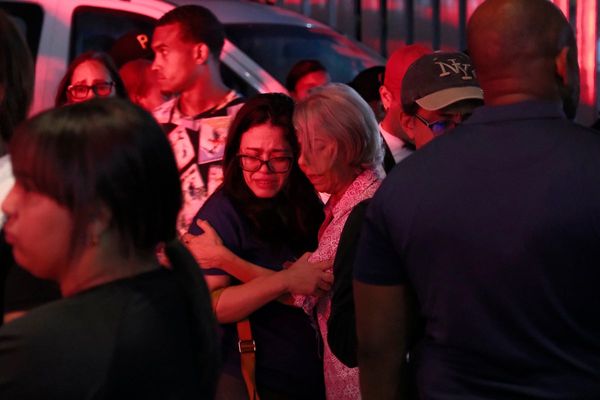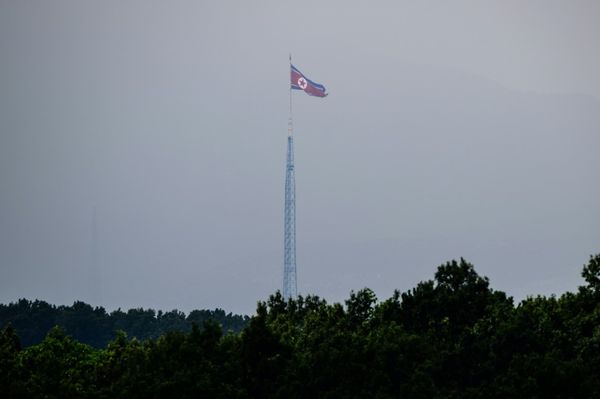During his 2016 election campaign, Donald Trump famously declared he could shoot somebody in the middle of New York's Fifth Avenue and not lose any voters.
The statement was hyperbolic, but the message was clear: Behaviour that may sink another politician doesn't often stick to him.
Last week, the Washington Post revealed seven hours and 37 minutes of White House phone logs from January 6, 2021 — the day Mr Trump's supporters stormed the Capitol — are missing.
Or perhaps they never existed.
The gap, between 11:17am and 6:54pm, is notable among 11 pages of relevant internal White House records, which were handed over to the House Select Committee investigating how the riot unfolded.
It also echoes another political scandal involving a Republican administration: Watergate.
In 1974, the Nixon administration released 1,245 pages of transcripts of recorded White House conversations as staff were accused of engaging in illegal or clandestine activities.
It was hoped the transcripts would clear then-US president Richard Nixon of wrongdoing.
But one crucial 18-and-a-half-minute conversation was erased, which only heightened suspicions of a cover-up going all the way to the top.
Mr Nixon soon resigned under the cloud of impeachment.
Mr Trump, the only US president to survive two impeachment trials, has so far avoided legal consequences for the events of January 6.
In recent weeks, however, the investigation into his attempt to overturn the results of the 2020 presidential election has been gaining momentum.
Mr Trump may have lost the election, but he still has a lot on the line.
With the possibility of running again in 2024, criminal charges could stymie his ambitions.
Could the former president's missing hours, like his predecessor's missing minutes, ultimately be his undoing?
The Watergate scandal and a sense of political deja vu
In the summer of 1972, police arrested five men who broke into the Democratic National Headquarters at the Watergate complex in Washington.
They were attempting to bug the office and dig up dirt on Mr Nixon's political rivals ahead of the presidential election.
"It began as relatively innocuous dirty trick," Jeffrey Engel, a historian and the founding director of the Centre for Presidential History at Southern Methodist University, said.
"What's really fascinating about it is it spirals from there.
"Watergate ... refers to the entire series of investigations, cover-ups [and] lawsuits that the Nixon administration and President Nixon engaged in, basically moving ever and ever more vigorously to protect the last lie that they just offered."
Like Mr Trump, an embattled Mr Nixon repeatedly tried to block the National Archive from releasing records that could embarrass or even incriminate him.
After months of litigation and negotiation, the Supreme Court ruled Mr Nixon could not lean on executive authority to thwart an impeachment investigation.
"The president wound up giving all this data and information over to congressional investigators," Mr Engel said.
"Most famously, there is an 18-and-a-half-minute gap, which ... we've never had a universally accepted explanation for."
The missing conversation took place in 1972 between Mr Nixon and his chief of staff.
The president's secretary, Rose Mary Woods, who was responsible for transcribing such meetings, claimed to have accidentally taped over the recording — a feat she tried to re-enact for reporters, rather unconvincingly.
"I think most likely those 18-and-a-half minutes contained something that President Nixon found incriminating," Mr Engel said.
"I stressed the word 'incriminating' because he handed over hours and hours and hours of tapes which were extraordinarily embarrassing."
What does Mr Nixon's fate tell us about Donald Trump's future?
Jill Wine-Banks, the Watergate prosecutor who cross-examined Ms Woods, wrote in a recent op-ed that the similarities between the two incidents were immediately obvious to her, but so were the differences.
"Nixon's gap was a single conversation about covering up a third-rate burglary," she wrote.
"Trump's potentially hours of missing conversations likely regarded the ongoing insurrection and various alleged plans to overturn a free and fair election."
During the 457 minutes Mr Trump failed to officially account for, a crowd of his supporters marched down Pennsylvania Avenue, the road that connects the White House to the Capitol.
Politicians from both parties and chambers of Congress, trying to certify Joe Biden's presidential election win, barricaded themselves in as the mob breached the building's entrance.
The former president tweeted throughout the day, and according to the White House phone logs, called at least 19 people on either side of the gap.
There is also extensive reporting of conversations Mr Trump had with his allies, including with Republican senator Mike Lee and House Minority Leader Kevin McCarthy, which were not listed.
This has led to speculation Mr Trump may have been communicating via back channels, either using aides' phones or "burner" phones, which are usually prepaid and disposable.
He is widely known to use other people's phones, however.
"One possible explanation is there are no logs because President Trump and those around him deliberately and consciously decided to ensure that there was no record," Mr Engels said.
"So, it's not that they are hiding records, it's that they made a point of not creating them."
Did Donald Trump commit a felony?
With the January 6 committee continuing its investigation, a federal judge has labelled Mr Trump's refusal to cede power an attempted "coup".
In a recent ruling, US District Judge David Carter wrote: "The court finds it more likely than not that President Trump corruptly attempted to obstruct the Joint Session of Congress on January 6, 2021.
"The illegality of the plan was obvious."
Judge Carter ruled the committee should be given access to emails to Mr Trump from his former lawyer, John Eastman, who masterminded a plan to have then vice-president Mike Pence block the certification of electoral college votes.
"[It] was a coup in search of a legal theory," Judge Carter wrote.
Dr Eastman argued the emails were protected by attorney-client privilege — a claim undermined by the "crime-fraud exception", which renders the privilege redundant if used to hide legal violations.
Neither Judge Carter nor the January 6 committee has the right to charge Mr Trump with a crime, however.
That remains up to the Department of Justice (DOJ), which, under the cautious leadership of US Attorney-General Merrick Garland, has kept a tight lid on its plans.
"In one sense, the findings have no legal significance for Donald Trump," said Mark Graber, a professor at the University of Maryland School of Law.
"A judge who calls me a criminal in a case I'm not part of doesn't make me a criminal legally.
"I have to be tried by a jury and indicted."
Even so, Judge Carter's words may give some Republicans pause and foreshadow future charges from the DOJ.
"Even if it's not legally binding, I would rather not have a judge call me a criminal," Professor Graber said.
"[It] may be that the Trump wing of the Republican party is starting to lose some steam.
"This will help a whole lot in removing Donald Trump from the American political scene. But it's likely to be a very slow removal.
Department of Justice may soon make its move
Since Judge Carter's ruling, Mr Garland has been under increased scrutiny for his slow and deliberative approach.
However, he has resisted calls from Democrats to move more quickly with the November deadline of the midterm elections fast approaching.
"The only pressure I feel, and the only pressure that our prosecutors feel, is to do the right thing," he recently told reporters.
"That means we follow the facts and the law, wherever they may lead."
Professor Graber said he was not surprised by the department's unwillingness to be swayed by outside pressure.
"Prosecutors do not like losing cases," he said.
"And this is a very difficult case.
"I think whatever they do, they want to make sure every I is visibly dotted, every T is impeccably crossed."
Meanwhile, the January 6 committee is closing in on those closest to Mr Trump, most recently questioning his daughter Ivanka and her husband Jared Kushner.
Given Mr Trump's ability to shake off controversy, Mr Engels agreed any case against the former president would need to be watertight
"I can't imagine almost anything that President Trump couldn't muscle through in terms of his own reputation," he said.
"He could be in jail and that would confirm, for many of his supporters, his righteousness."







